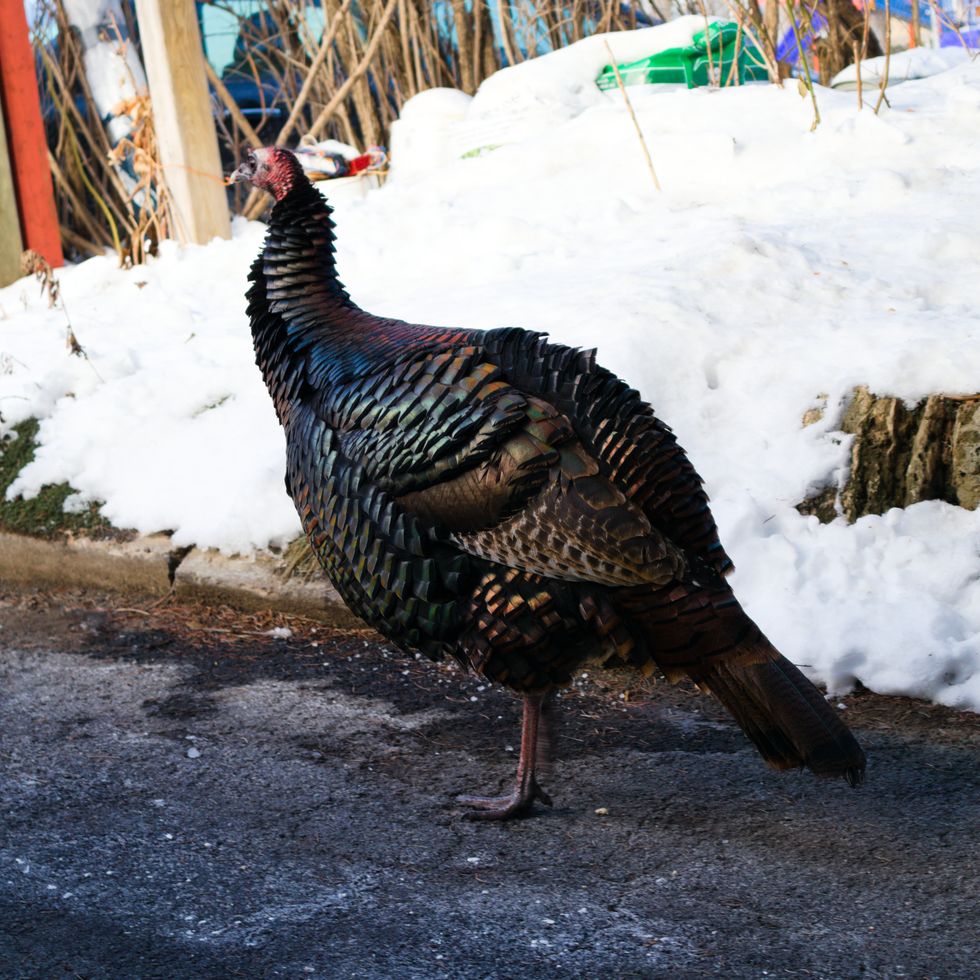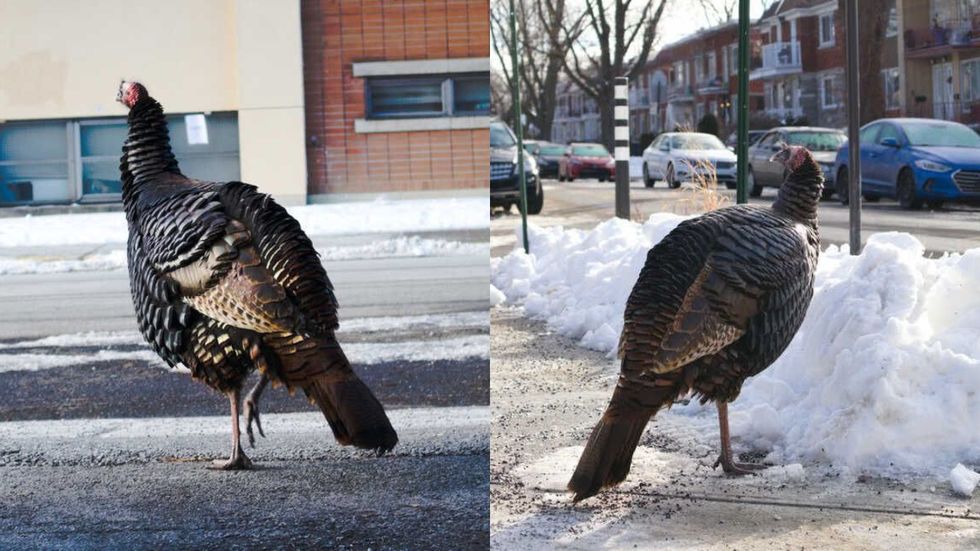Butters The Famous Montreal Turkey Might Be A Sign Of A Turkey Invasion

Butters the wild turkey, iconic resident of Montreal's west end, has become the city’s newest animal influencer these last few months. He even has his own Facebook page. But Butters the turkey and his brethren are new in town, says Canadian Wild Turkey Federation biologist Tadeusz Splawinski.
In fact, after being hunted to near-extinction by the beginning of the 20th century, turkeys are experiencing a population explosion in Quebec thanks in part to climate change, he said.
Editor's Choice: Montreal Researchers Have Found An Oral Drug That Can Help Treat COVID-19
Decades of rising temperatures have caused this species that previously lived in the northern United States to move farther north, he said.
That means there could be more turkeys roaming the streets of Montreal in the future and, though Butters seems extremely chill, Splawinski suggested we implement human-turkey conflict resolution strategies, just to be on the safe side.
“We can expect to see more such observations and interactions as the species expands and population density increases,” he said.
“Historically, wild turkeys have been more common south of the border, so people there have been exposed to these conflicts for longer than we have here in Quebec.”
What's the history of wild turkeys in Quebec?
In the olden days, there were plenty of wild turkeys in the province but hunting and habitat loss caused their extirpation from southern Quebec and Ontario, said Splawinski.
The species was saved thanks in part to a huge conservation effort, including 40 relocation programs between 2003 and 2013 involving more than 600 captured wild turkeys.
As their numbers rebounded, they’ve adjusted remarkably well to urban and suburban environments thanks to ample food and few natural predators, he said.

And as they don't fare well during periods of very cold weather or deep snow, “a warming climate and more mild winters will expand range and population density further.”
“In the province of Quebec, wild turkeys were first observed by ornithologists in 1976,” said Splawinski.
“These observations coincide with its northward expansion from Ontario, New York, Vermont, and Maine. Milder winters and an increase in suitable habitat were the main drivers of range expansion.”
The resulting increase in the turkey population has meant more opportunities to harvest these delicious creatures.
When do turkeys attack?
Turkeys ain't no chickens, explained Splawinski.
A mature male wild turkey can weigh over 25 pounds and has long sharp spurs on the back of its legs for weapons.
“They can therefore actually cause significant injury to a human,” he said.
And though they’re usually docile, the males become ornery during breeding season when they’ll “challenge any perceived competitor, including humans,” he said.
Hopped up on hormones with snoods erect and tail feathers on display, the birds strut around to establish dominance and court females, he said.
And if a sex-crazed turkey becomes habituated to humans, he might challenge you for top spot on the pecking order — as turkey society is not unlike high school, where the biggest most popular birds rule the roost and get all the chicks.
“Lots of videos on YouTube show wild turkeys chasing property owners, mail carriers, and even pets,” said Splawinski.
“Although these animals can seem cute and harmless, they have the potential to cause significant damage.”
Thankfully, Splawinski said you can scare them off by putting on your own dominance display using shouts, threats, and hand gestures, just like in high school.

“The goal is to prevent the turkey from intimidating you, therefore you must establish dominance so that they do not perceive you as lower on the pecking order,” he said.
“Do not run, back away, or turn your back. Step toward the turkey and act confidently.”
More than one Butters in Montreal?
As it seems nobody’s been able to catch Butters and pull up its skirts there’s been some debate regarding its sex.
The Montreal Gazette has reported that Butters is female but Splawinski insists he’s an immature male.
“There have been quite a lot of other wild turkey sightings throughout Montreal, including Verdun, the West Island, and north Montreal. It is possible that they are reporting on another bird and have them mixed up.”
That means Montreal’s turkey population could be on the rise. And while they’re fascinating, they’re still wild animals, and getting habituated to people could ultimately lead to their demise.
Splawinski said feeding Butters is therefore a bad idea.
“Try to limit potential food sources. Clean up bird feeders and spilled seed, as well as unsecured garbage, do not scatter seeds, and don’t offer handouts,” he said.
“It may also be a good idea to talk with neighbours to ensure that they are not feeding the birds (my friend is currently feeding Butters, other residents probably as well).”
Hit and runs are also a threat to Butters and his kind as they often respond to shiny things and their own reflections, causing them to sometimes go after car mirrors and windows, he said.
- Butters 2.0? Montreal Has Another Wild Turkey & More Could Be On The Way - MTL Blog ›
- Quebec Police Warn Residents Of Suspected Polar Bear Sighting In Gaspé - MTL Blog ›
- Quebec Police Warn Residents Of Suspected Polar Bear Sighting In Gaspé - MTL Blog ›
- 4 White Sharks Have Been Spotted In Canadian Waters — Here's Where - MTL Blog ›
